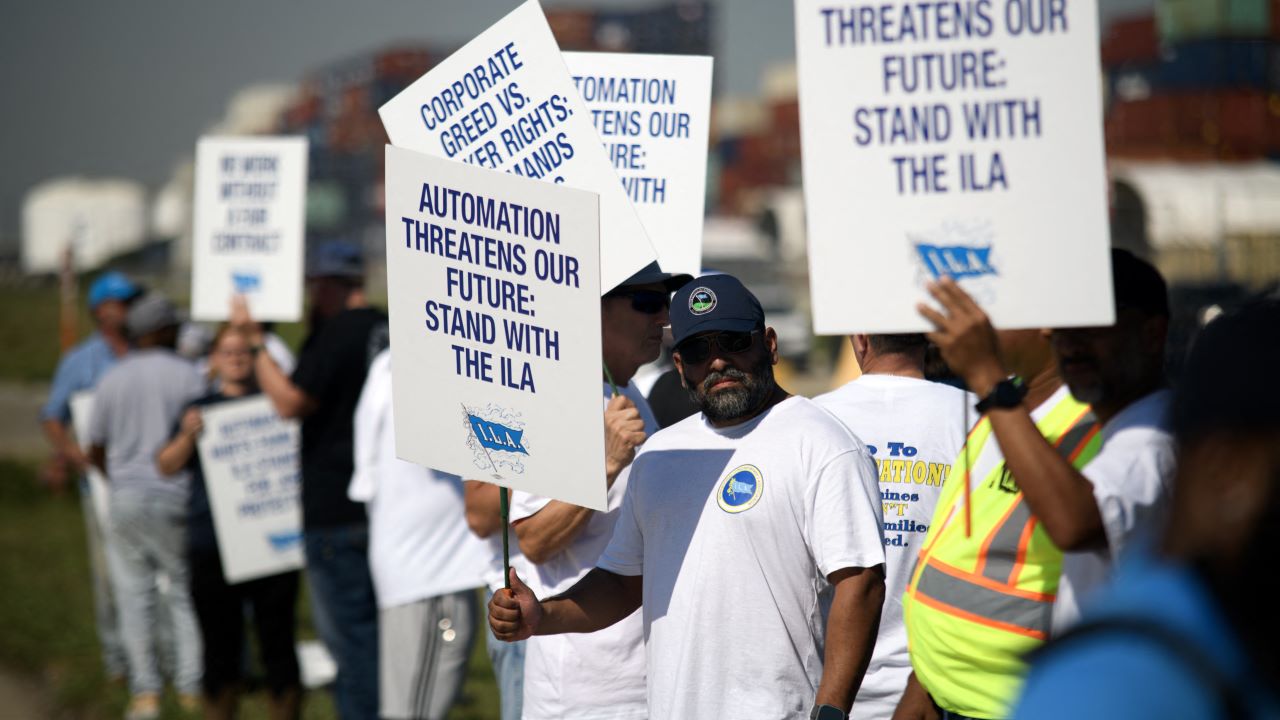A labor strike by unionized dockworkers at East and Gulf Coast ports began Tuesday with the union and port employers at an impasse over a new contract, with the use of automation and technology at ports a sticking point in negotiations.
The International Longshoremen’s Association (ILA) and its roughly 45,000 workers are seeking a 77% pay raise over the new contract, as well as putting a stop to port automation projects that could cost jobs. In a statement Tuesday, the ILA said that it is “steadfastly against any form of automation – full or semi – that replaces jobs or historical work functions. We will not accept the loss of work and livelihood for our members due to automation.”
The U.S. Maritime Alliance (USMX), which represents port employers in negotiations, said in a statement Monday that its offer would’ve provided a 50% raise plus improved retirement and health care benefits and would also “retain the current language around automation and semi-automation.”
Eric Hoplin, CEO of the National Association of Wholesaler-Distributors (NAW), said on FOX Business’ “Mornings With Maria” on Tuesday that the union’s automation demands are “unrealistic.” He noted that major ports around the world like Shanghai, China, Rotterdam in the Netherlands and Singapore have embraced automated cranes and vehicles in ports adding, “We’re already three decades behind.”
Douglas Kent, EVP of Corporate and Strategic Alliances at the Association of Supply Chain Management (ASCM), told FOX Business in an interview that, “The port infrastructure in the U.S. also has to remain competitive on the global stage.”
“If you take a look at things that are happening in Europe, in the Middle East, in UAE, in Singapore, for example, some of the more advanced ports, you’re seeing an investment in infrastructure to take advantage of increased levels of technology that can be integrated to drive efficiencies and effectiveness and continue flow.”
“That particular issue is a huge sticking point because it of course protects the worker because we’re keeping things more manual. But at the same time, it’s costing more to do those things because we are integrating technology and we’re having to pay more for the longshoremen,” Kent said.
BUSINESS GROUPS CALL ON BIDEN TO INTERVENE IN PORT STRIKE
“The big question that that raises is, how sustainable is that situation? I mean this is, again, another multi-year contract,” he said. “Are we really going to commit ourselves to not allowing for technology and automation to be part of the future state equation? It’d be foolish to do so, so I think there’s going to have to be some give and take there, perhaps automation that is less impactful to the amount of labor that’s needed to do the job.”
“I think what they should be talking about is, what’s the change in the nature of the role? Is it that we’re doing things that are, let’s say, more intellectual versus manual, but not necessarily reducing the workforce to take advantage of the technology and allow for some scalability of the capacity management. So new skill sets, new capabilities, new competencies,” Kent explained.
THE TAFT-HARTLEY ACT: WHY BIDEN COULD USE THIS LABOR LAW TO PREEMPT A PORT STRIKE
Alexander Field, an economics professor at Santa Clara University’s Leavey School of Business, told FOX Business, “From the long-run perspective, automation is good because it increases productivity, and productivity, ultimately, is what drives our living standards.”
“Now, that’s not much comfort if somebody loses their job because of automation. So the question is whether that can be handled by attrition or by compensation. It’s a real dilemma in terms of the demands of the union,” Field said.
Ricardo Ernst, professor of global business at Georgetown University’s McDonough School of Business, told FOX Business, “Not embracing technology is unfortunately very myopic because that is one of the sources of competitiveness. If we don’t do it, believe me, some other place is going to do it and then they’re going to be more competitive than us.”
GET FOX BUSINESS ON THE GO BY CLICKING HERE
“What needs to be discussed is what alternative we find for them. What are the options, do we retrain them? It’s a much larger issue than just saying we are stopping automation,” Ernst said. “Automation is unavoidable.”
